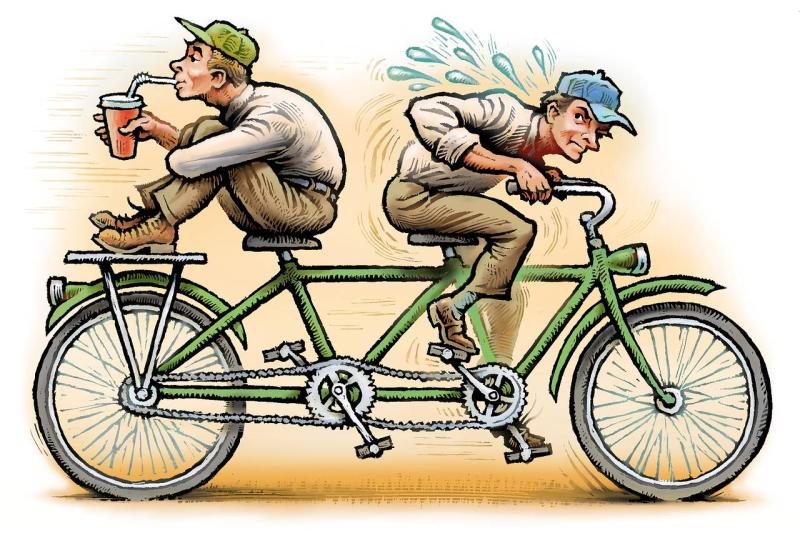How Income Equality Helped Trump


Frenzied rhetoric about income inequality was a larger theme in Hillary Clinton’s 2016 presidential campaign than in any previous American election. When the ballots were counted, however, not only did income inequality fail to move voters, but a massive shift in voting preference among lower-middle and middle-income Americans led to the election of the wealthiest president since George Washington. Now, startling new data on government spending and taxes suggests a novel explanation for this voter shift: It was a backlash against rising income equality among the bottom 60% of American household earners.
The new analysis was published in April by the Cato Institute’s John F. Early, a former assistant commissioner of the Bureau of Labor Statistics, and it provides the most comprehensive accounting to date of how taxes and government payments affect income distribution in the U.S. His study includes the roughly $1 trillion of annual government spending not currently counted in the U.S. Census Bureau’s income-distribution tables. That includes Medicaid, food stamps, the earned-income tax credit, and 85 other federal payments and services, along with similar state and local income supplements. The study also subtracts federal, state and local taxes from individuals’ measured income, an adjustment not contained in the census data.
The most surprising finding is the astonishing degree of equality among the bottom 60% of American earners, generated in part by the explosion of social-welfare spending and the economic and wage stagnation during the Obama era. Hardworking middle-income and lower-middle-income families must have recognized that their efforts left them little better off than the growing number of recipients of government transfers. The perceived injustice of this equality helped drive the political shift among blue-collar workers, many of whom supported the pro-growth candidacy of Donald Trump in 2016 despite having voted for Mr. Obama in the two previous presidential elections.
The bottom quintile earned 2.2% of all earned income in 2013, but after adjusting for taxes and transfer payments, its share of spendable income rose to 12.9%—six times its proportion of earnings. The second quintile’s share more than doubled, rising from 7% of earned income to 13.9% of spendable income. For the third quintile, middle-income Americans, the increase was much smaller, from 12.6% to 15.4%.
Not surprisingly, high earners lost a considerable share of their earnings after taxes and transfers are taken into account. The fourth quintile’s share fell from 20.5% to 18.6%, while the top quintile dropped from 57.7% of earnings to 39.3% of consumable income. In other words, the top quintile’s share of earnings was 26 times that of the bottom quintile, but after taxes and transfer payments its share of spendable income was only three times as much.
Even more startling is the near equality among the bottom three quintiles. The bottom quintile, which earned only 2.2% of all earned income, had virtually the same share of spendable income as the second quintile, lower-middle-income Americans. This equality is despite the fact that lower-middle-income workers earned more than three times the share of income and worked 21/2 times as much, measured by comparing each group’s number of full-time workers relative to its working-age population. Middle-income workers earned almost six times the share of income and worked almost four times as much compared with the bottom quintile, but they enjoyed only about 20% more spendable income.
And even these numbers understate the huge difference in work effort. Compared with the bottom quintile, the lower-middle-income quintile had almost four times as many working-age families whose members worked two or more jobs, and the middle-income quintile had more than seven times as many families with members working two or more jobs.
The politics of envy based on income inequality has always been a hard sell in the U.S. Few Americans resent Bill Gates, whose innovations made him megarich but also made the rest of us better off. Who resents Warren Buffett, who became one of the richest men in the world by raising the return on Americans’ savings and retirement accounts? George Mitchell, the Texas oilman who invented fracking, made oil and gas cheaper for the whole world—and he received only a tiny share of the wealth he created in so doing.
Americans tend to believe that people become rich because they are smart and work hard, but it is easy to see how a middle-income husband and wife who both work could resent that people who don’t work are about as well off as they are. It might be fair that Bill Gates is rich, but it seems unjust that 60% of Americans have virtually the same standard of living despite dramatic differences in the effort they exert and the income they generate.
The harder people worked without getting ahead, the more reason they had to feel disrespected and alienated in November 2016. President Obama and Hillary Clinton mocked their values. The tax and regulatory policies of the Obama era caused economic growth and middle-income wages to stagnate. But what must have added insult to these injuries was the increasingly obvious fact that the boom in government benefits and the decline of economic growth had all but eliminated the rewards that middle-income Americans traditionally received for working hard. The explosion of social spending, and the dependency it generated, no doubt benefited the Obama campaign in 2012. But that same spending helped create the wagon-puller backlash that defeated Mrs. Clinton in the next election.
 Article is LOCKED by author/seeder
Article is LOCKED by author/seeder



“The politics of envy based on income inequality has always been a hard sell in the U.S. Few Americans resent Bill Gates, whose innovations made him megarich but also made the rest of us better off. Who resents Warren Buffett, who became one of the richest men in the world by raising the return on Americans’ savings and retirement accounts? George Mitchell, the Texas oilman who invented fracking, made oil and gas cheaper for the whole world—and he received only a tiny share of the wealth he created in so doing.
Americans tend to believe that people become rich because they are smart and work hard, but it is easy to see how a middle-income husband and wife who both work could resent that people who don’t work are about as well off as they are. It might be fair that Bill Gates is rich, but it seems unjust that 60% of Americans have virtually the same standard of living despite dramatic differences in the effort they exert and the income they generate.
The harder people worked without getting ahead, the more reason they had to feel disrespected and alienated in November 2016. President Obama and Hillary Clinton mocked their values. The tax and regulatory policies of the Obama era caused economic growth and middle-income wages to stagnate. But what must have added insult to these injuries was the increasingly obvious fact that the boom in government benefits and the decline of economic growth had all but eliminated the rewards that middle-income Americans traditionally received for working hard.”
The backlash of the middle and working classes did lead to Trumps victory in 2016 as the democrats are an alliance of the very rich and the poor against them.
There's always going to be income inequality. If there is not there's not much use in trying to improve oneself. Funny how this concern for income inequality is so similar and important to those who have no problem moving up the ladder, hanging out with the 1% and just keep on talking about the income inequality as a political tool, thinking, evidently their hypocrisy is invisible to quite a few Americans.
Bernie Sanders comes to mind.......
You know, I actually got tired of the same ole same ole on the front page, so I wandered over to the 2nd and 3rd pages. I was actually wondering about this the other night when I couldn't sleep. I'm in the medical field, which for the most part are women, if you don't count doctors. Would a male nurse make more than a female nurse? Its a legitimate question. I also know of CMAs, NOT CNAs(because they cannot do much), that are only making 12.75/hr, and they actually draw blood and do lab work for pts. This is where the whole $15/hr thing gets me..... You can demand $15/hr for flipping a burger or warming a bun and still get an order wrong, but a person who takes blood for labs and does your vitals AND makes sure they don't get things wrong, and have gone to school, only make $12.75.... I'm just wondering y'all thoughts on this
E.A With All Due respect::
Please do not get this wrong::
What about the " demand supply " model, why would ANY one accept to work at that low pay rate?
Meh..... I see what you are saying, but today may be different, the actual person I was talking about making $12.75 an hour has been at the same practice for 7 years and does everything under the sun. I know it's their own fault for staying but doc takes care of her and her family.
Well, 7 years ago, the job market probably wasn't was it is today. Honestly, I think shes comfortable, but looking for a new job. $12.75 is what I made as a receptionist starting out back in 2001. I'm just saying..... it kinda pisses me off that people who work for McD's want $15 an hour and a lot of our medical workers don't make that and they take care of people and give them medicine....and I'm talking about the med staff lower on the totem pole
E.A OK that is understandable.
But my question still stands, and the answer is?
Honestly, I don't have an answer to that.... maybe because they don't think they can find work anywhere else or because big medical companies such as Wellstar et al.... promise certain things. Maybe the benefits outweigh or offset the crappy pay. Honestly, people in the medical field need better pay than people working at McDonalds. They actually go to school for what they do.
E.A Yes I think you have hit the Nail on the head!!
E.A It is wise to look at the " OverALL" package rather then just "wage "
Depends on the cost of living in an area and what the min wage is in that area. If they live in a place where the min wage is 7.25 and 800 a month rents a decent place is one thing but if the min. Wage is 11.00 and it takes 1200 a month for that decent place then the 12.75 would in fact seem unfair.
I have worked the same place my entire career and while my wages seemed on the low side much of the time, the most generous sick and vacation time, retirement accounts, and real quality health insurance made up for it.
Absolutely it is. Sometimes other factors are as or more important.
Now unemployment is the lowest among minorities EVER! How about that?
Please post comments in all HA's seeds, so that they can be locked during suspension.
Truly wonderful how well minorities are doing under trump.
Locked due to the suspension of the seeder